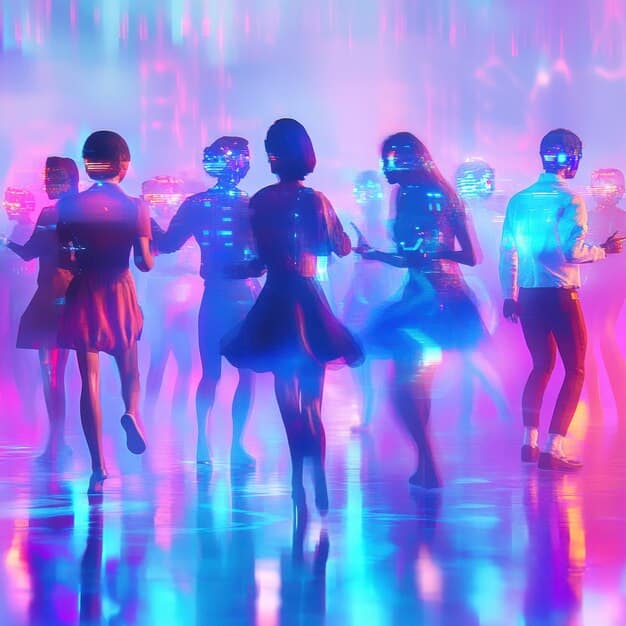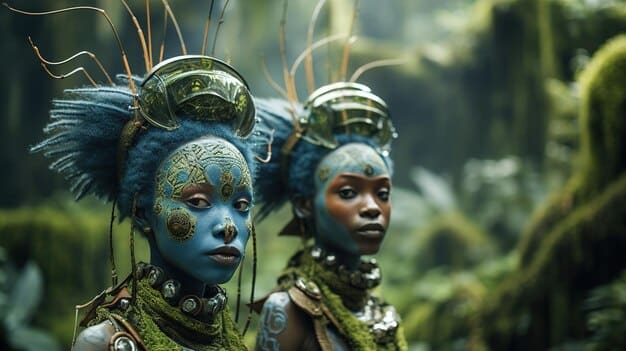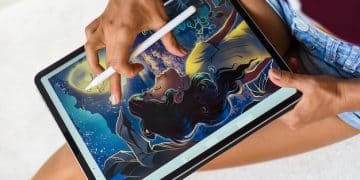Examining the Cultural Impact of Metaverse and VR in 2025

Examining the Cultural Impact of the Metaverse and Virtual Reality in 2025 reveals a transformative shift in social interactions, entertainment, and commerce, creating both opportunities and challenges for cultural preservation and digital identity.
The year 2025 promises to be a pivotal moment in the evolution of digital culture, especially concerning the impact of the metaverse and virtual reality. Let’s delve into the potential shifts that will ripple through society.
The Metaverse: A New Cultural Landscape
The metaverse is poised to become more than just a virtual playground; it may evolve into a significant cultural landscape by 2025. This digital realm offers new avenues for expression, connection, and identity formation.
Understanding how the metaverse will shape cultural norms and practices is crucial as it becomes increasingly integrated into daily life.
Changing Social Interactions
Social interactions within the metaverse are undergoing a transformation. Traditional boundaries are blurring as individuals connect across geographical and cultural divides.
New Forms of Artistic Expression
The metaverse is fostering new forms of artistic expression. Digital artists are experimenting with immersive installations, virtual performances, and interactive experiences that transcend physical limitations.
- Virtual concerts and music festivals are becoming commonplace, attracting audiences from around the globe.
- Digital art galleries showcase NFTs and other forms of digital artwork, creating new markets for creators.
- Interactive storytelling and virtual theater offer engaging experiences that blend narrative with user participation.

The rise of the metaverse presents both opportunities and challenges. While it offers a platform for diverse voices and artistic innovation, concerns about cultural appropriation and digital inequality must be addressed to ensure inclusivity.
Virtual Reality: Revolutionizing Cultural Experiences
Virtual reality (VR) is revolutionizing how we experience and engage with culture. By 2025, VR technology is expected to become more accessible, enhancing cultural experiences in unprecedented ways.
Imagine being able to virtually visit historical sites, museums, and cultural events from the comfort of your home.
Immersive Historical Tours
VR provides immersive historical tours, allowing users to step back in time and explore ancient civilizations. These virtual experiences offer a unique perspective on history, bringing it to life in vivid detail.
Enhancing Museum Visits
Museums are leveraging VR to enhance visits, offering virtual exhibits and interactive displays. VR allows visitors to explore artifacts and artworks in a more engaging and informative way.
VR’s impact extends beyond entertainment and education. It has the potential to bridge cultural gaps, promote empathy, and foster a deeper understanding of different perspectives. As VR technology advances, it is essential to consider its ethical implications and ensure equitable access to these transformative experiences.
Digital Identity and Cultural Representation
Digital identity within the metaverse and VR environments is becoming an increasingly important aspect of cultural representation. As users create avatars and interact in virtual spaces, they express their cultural identities in new and innovative ways.
However, this also raises questions about authenticity, cultural appropriation, and the potential for misrepresentation.
Expressing Cultural Identity
Users express their cultural identity through avatars. They can customize their appearance, clothing, and accessories to reflect their heritage, beliefs, and values.
Addressing Cultural Appropriation
Cultural appropriation is a significant concern within digital spaces. Ensuring that users are respectful and mindful of cultural traditions and symbols is crucial to fostering inclusivity.
- Promoting cultural sensitivity and awareness through educational initiatives.
- Establishing guidelines and protocols for avatar creation and representation.
- Encouraging open dialogue and feedback within virtual communities.
The metaverse offers opportunities for cultural exchange and understanding. However, it is essential to address issues of digital identity and cultural representation to ensure that virtual spaces are inclusive, respectful, and authentic reflections of diverse cultures.

Economic Opportunities and Challenges
The metaverse and VR technologies are creating new economic opportunities while also presenting certain challenges. As these platforms become more integrated into daily life, they are transforming traditional business models and creating new markets.
However, it is important to address concerns about digital inequality and wealth distribution to ensure that everyone has the opportunity to participate in the digital economy.
New Business Models
VR fosters new business models. Virtual storefronts, immersive advertising, and digital marketplaces are emerging as key components of the metaverse economy.
Digital Marketplaces
Digital marketplaces for virtual goods and services are rapidly expanding. NFTs, virtual real estate, and in-world experiences are becoming valuable assets within the metaverse economy.
The economic impact of the metaverse and VR technologies is far-reaching. While these platforms offer immense potential for economic growth and innovation, it is essential to consider the potential challenges and risks. Addressing issues such as digital inequality, regulatory uncertainty, and consumer protection will be critical to ensuring that the benefits of the digital economy are shared equitably.
The Role of Education and Cultural Preservation
Education and cultural preservation play a crucial role in shaping the impact of the metaverse and VR technologies. By integrating these tools into educational programs and cultural initiatives, we can foster a deeper understanding and appreciation of diverse cultures.
It is important to ensure that these technologies are used in ways that promote inclusivity, respect, and authenticity.
Integrating VR into Education
VR allows for immersive learning experiences. Students can virtually visit historical sites, explore different cultures, and engage with interactive educational content.
Cultural Preservation
VR can aid in cultural preservation. Virtual replicas of historical sites, artifacts, and cultural traditions can be created to preserve them for future generations.
- Virtual museums and historical sites that offer immersive tours and interactive displays.
- Digital archives of cultural artifacts and traditions that can be accessed from anywhere in the world.
- Educational programs that use VR to promote cultural understanding and empathy.
As the metaverse and VR technologies continue to evolve, it is essential that education and cultural preservation efforts adapt to meet the challenges and opportunities that these platforms present. By integrating these tools into educational programs and cultural initiatives, we can foster a deeper understanding and appreciation of diverse cultures, while also preserving our shared heritage for future generations.
Ethical Considerations and the Future of Culture
Ethical considerations are paramount as the metaverse and VR technologies become increasingly integrated into our cultural landscape. Ensuring that these platforms are used responsibly and ethically is crucial to safeguarding cultural heritage, promoting inclusivity, and fostering a deeper understanding of different perspectives.
As we look to the future, it is important to consider the potential risks and challenges that these technologies pose, as well as the opportunities they offer for cultural enrichment and innovation.
Data Privacy
Data privacy is a concern. Ensuring that users’ personal information is protected and used responsibly is essential for maintaining trust and fostering a safe digital environment.
Responsible Use of AI
The responsible use of AI is important. Algorithmic bias, misinformation, and the potential for manipulation are all ethical considerations that must be addressed to ensure that AI is used in ways that promote cultural enrichment and understanding.
As we navigate the evolving landscape of the metaverse and VR technologies, it is imperative that we prioritize ethical considerations and work towards a future where these platforms are used in ways that promote cultural diversity, inclusivity, and understanding. By fostering a responsible and ethical approach, we can harness the transformative power of these technologies to create a more connected, informed, and culturally enriched world.
| Key Point | Brief Description |
|---|---|
| 🌍 Cultural Landscape | The metaverse may be a new space for cultural expression. |
| 🎭 Digital Identity | Cultural representation through avatars and virtual interactions. |
| 💰 Economic Impact | Potential for new business models and marketplaces. |
| 📚 Education | VR and metaverse integration enhances learning and cultural preservation. |
Frequently Asked Questions
The metaverse could create virtual extensions of real-world events, or compete with and diminish physical attendance. Hybrids may emerge to enhance accessibility.
Cultural appropriation in VR/AR involves unauthorized use of cultural elements. Risks include misrepresentation, trivialization, and commercial exploitation, harming authentic cultural practices.
Yes, VR/AR can provide immersive educational experiences. Virtual field trips to historical sites and cultural simulations enhance understanding, engagement, and retention across diverse learners.
Museums should blend physical and digital experiences. Offer virtual tours, interactive exhibits, and augmented reality overlays to enhance visitor engagement and accessibility, boosting visitor engagement.
Developers should prioritize user privacy, data security, and cultural respect. Employ ethical design principles, transparent data practices, and culturally sensitive guidelines to ensure responsible development.
Conclusion
Examining the cultural impact of the metaverse and virtual reality in 2025 reveals a complex landscape filled with both opportunities and challenges. From transforming social interactions and artistic expression to revolutionizing cultural experiences and creating new economic models, these technologies are poised to reshape how we engage with the world around us. By addressing ethical considerations, promoting inclusivity, and fostering cultural understanding, we can harness the transformative power of the metaverse and VR to create a more connected, informed, and culturally enriched future.





